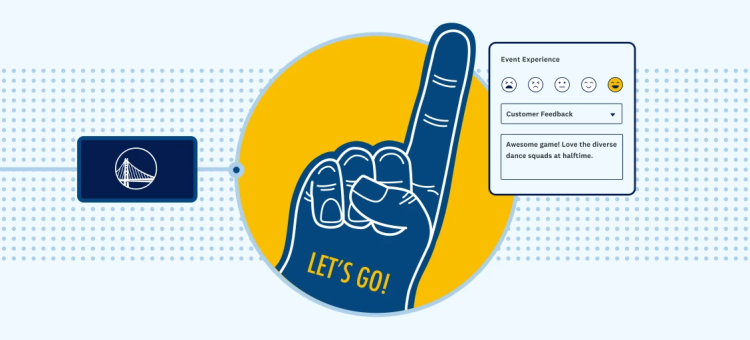This is a guest post by Hannah Prince, Content Marketing Manager at SurveyMonkey Technology Ecosystem Program partner, Rybbon.
Consumer behaviors have always evolved over time, but with advancing technology, social and political divisions, and the COVID-19 pandemic, that evolution is happening faster than ever. Many businesses may feel as though they’re playing catch-up and need to adapt quickly.
Here are four ways that consumer habits are changing and some tips on how businesses like yours can adapt and succeed.
Consumers are more willing to take their business elsewhere
Online shopping and services have been on the rise for years, but the pandemic accelerated the trend significantly, thanks to lockdowns, health concerns, and supply shortages. A Fortune/SurveyMonkey poll found that 67% of people say online shopping has been vital during the pandemic, and 40% are spending more online than before.
With this shift, consumers have realized how many options they truly have, meaning their tolerance for bad experiences is lower—they know it’s easy to switch to a company that will provide a better one. More than half (55%) have decided whether to stay with or leave a company simply based on its customer service, according to SurveyMonkey and Freshworks. Forty-three percent expect brands to keep their higher customer service levels after the pandemic ends.
How businesses can adapt: Companies must put an even greater focus on generating customer loyalty. Good customer service is a start, but also consider how you can continuously delight your customers. There are many ways to do this, including:
- Incentivize repeat business. Offer consumer promotions that reward repeat customers for continuing to use your brand. Think beyond discounts—a digital reward with a purchase is likely to be more effective. Aberdeen research found that companies see a 21% higher increase in average profit margin when they use reward-based promotions instead of discounts.
- Set up a loyalty program. Let customers earn rewards for engagement, referrals, and other brand advocacy. This creates a fun experience for them, plus it turns your happy customers into lead generators.
- Make it right with unhappy customers. Customer service isn’t just about solving problems, it’s also about turning a bad experience into a good one. It’s inevitable that there will be customers who are unhappy, but you can give them digital rewards to help rebuild trust and hopefully retain their business.
Consumers are prioritizing sustainability
Environmental concerns are continuing to grow among consumers, who increasingly want the brands they use to implement eco-friendly practices. In Simon-Kucher & Partners’ 2021 Global Sustainability Study, 85% of respondents said they have changed their purchase behavior to be more sustainable in the past five years. Sixty percent cited sustainability as an important factor in their purchase decisions.
How businesses can adapt: Businesses need to adjust their traditional strategies for all kinds of business operations. Many of your processes can go digital, keeping waste out of landfills and eliminating use of shipping services that contribute to air pollution and greenhouse gas emissions. You can also attract more customers by helping them make eco-friendly decisions that align with their personal missions.
For instance, provide the option for paperless billing and email receipts—even better, set that as the default. Instead of sending physical gifts or company swag to incentivize customers, research participants, and employees, opt for digital rewards, which are delivered instantly via email.
Consumers expect to see diversity, equity, and inclusion efforts
Social injustice and other diversity issues have become a hot topic, fueled by the spread of information and examples online and on social media. The influence those issues have on purchase decisions is growing, and consumers want to see businesses get involved. Nearly 70% say they approve of business leaders speaking out on social and political issues, according to a Fortune/SurveyMonkey poll. And the 2021 Power of Authenticity report, released by global public relations company FleishmanHillard, found that 65% of consumers say companies must commit to advancing diversity, equity, and inclusion to be more credible.
How businesses can adapt: For insights to be reliable, they have to be representative of your entire customer base or target audience. Collecting representative data with customer feedback programs and surveys is key to any effort to create a more inclusive brand image. Reach a diverse respondent pool by soliciting feedback where the consumers are—social media, for example—and not just from emailing your database.
Incentives can also help encourage participation from those who might not typically respond. Even better, offer diverse rewards that appeal to a wide range of people. Letting respondents choose the most compelling incentive for them—one appropriate for their geographic location and preferences—helps you get the representative sample you need to make conclusions based on the entirety of your diverse audience.
Consumers are more worried than ever about data security
Consumers have come to expect a certain level of protection against their data being misused or distributed, but their concern is sure to become an even bigger focus, especially with whistleblowers and activists raising awareness. Nearly 60% say “the threat to personal privacy online is a crisis, and we need forced changes to the way companies operate,” according to an Axios/SurveyMonkey poll. And their concerns are well founded: The Identity Theft Resource Center reported a 68% increase in the number of data compromises in 2021 over 2020. The cost to businesses, from both a financial and customer retention perspective, can be severe.
How businesses can adapt: The best way for companies to prevent data security breaches is to make sure they use secure tools for all their operations. Partner with platforms that prioritize security and are committed to maintaining customers’ privacy. Look for:
- Compliance with key privacy regulations. Any tool you use—whether it’s for distributing surveys, managing digital rewards, automating marketing tasks, or maintaining communities—must abide by the strictest of privacy laws. Two of the most important are the European Union’s General Data Protection Regulation, or GDPR, and the California Consumer Privacy Act.
- SOC 2 accreditation. Providers that are SOC 2-compliant have gone through an extensive auditing procedure to ensure they manage data securely and protect customers’ privacy.
- Single sign-on. SSO protects your systems and employees’ credentials, since usernames and passwords are the main target of cybercriminals.
- Anonymity when required. Organizations conducting anonymous surveys or research have an even higher burden to keep respondents’ personal information private. Make sure any platforms you use for surveys, communities, and incentives can support this by decoupling personal information and masking data.
Increase feedback to stay on top of consumer habits
If there’s one thing you can count on with consumer behaviors, it’s that they will always continue to change. Your customer feedback and market research programs are vital for keeping up with the current trends. How can you ensure they’re successful at getting you accurate, actionable data to inform your decision-making? Offering digital rewards and incentives helps increase engagement and survey response rates. Watch this webinar from Rybbon, the leading digital rewards management platform, to learn how to streamline survey incentives so you can get the insights you need to adapt and give consumers what they want.




